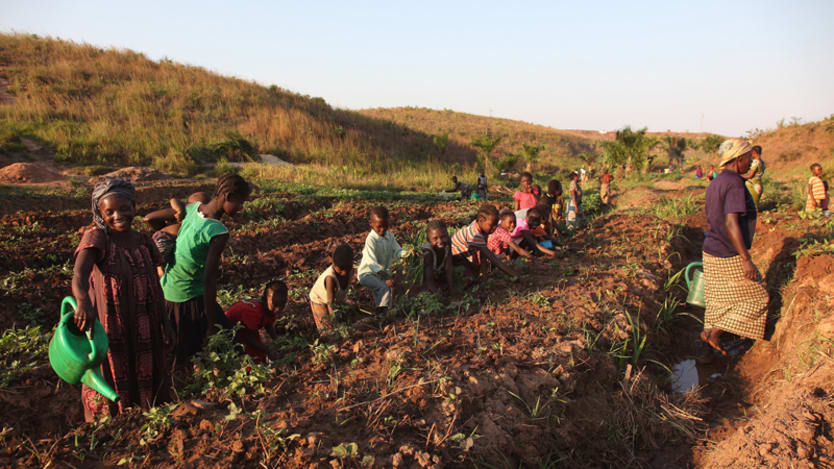
The story of Mary Twinomujun is one of struggle and perseverance, hardship, and opportunity. A farmer in the rural village of Kyankunyule, Uganda, Mary grows corn and cassava on a small plot of land. For years, she has had limited access to the tools and information she needs to improve production, increase income, and realize better nutrition for her and her children.
Twinomujun’s story is that of millions of women farmers in the developing world.
Women have less access to the tools, decision-making power, supplies, and information they need to help their families thrive. Many women are barred from making decisions in their own homes about how much money is spent on food even though they are the ones responsible for putting food on the table.
If women had access to the same information and resources as men, up to 150 million people could be lifted out of poverty.
—These entrenched norms and attitudes toward women make it far harder for them to receive basic access to things such as loans, quality seeds, and training. Things that men take for granted.
This is hardship. And this is the reality for Twinomujun and so many millions like her. But this is also opportunity: The U.N. Food and Agriculture Organization estimates that giving women equal access to basic resources and services could increase yields on women’s farms by 20-30 percent, which could raise macroagricultural outputs in developing countries by 2.5-4 percent.
The same report indicates that if women had access to the same information and resources as men, up to 150 million people could be lifted out of poverty. Providing women farmers with the tools and support to become more productive is also key to addressing climate change — it is estimated that if women could grow 20-30 percent more food on the same amount of land, we would avoid 2 billion tons of emissions between now and 2050.
To attack pressing global challenges, such as gender equity and the daunting prospect of feeding a future world of 9 billion people, we must support Twinomujun. She deserves a fair chance at improving her life and that of her family. And this support will go far beyond that — it will change her community and when we multiply the effect, change the world.
Twinomujun is one of the millions of female farmers around the world who would greatly benefit from agricultural skills training, as well as access to financing, new technologies, better seeds, and markets to sell products on the global stage.
When women farmers boost their production and generate income, they send their children to school, feed their families nutritious meals, keep their kids healthy over the course of their lives, expand their businesses, employ others, and build savings that help them weather tough times.
This is why CARE has launched “She Feeds the World,” an initiative to empower women farmers in developing countries to better support themselves, their families, and their communities. The PepsiCo Foundation is the program’s largest private sector supporter to date and is part of the company’s broader effort to support a more sustainable food system by empowering women in its own agricultural supply chain and by investing in multisector programs with the potential to achieve change at scale.
NGOs are the backbone of comprehensive programs such as She Feeds the World, built off decades of experience. But NGOs cannot do this work alone. It requires a holistic approach to change making, partnerships, and scale. To amplify these efforts and spread best practices, NGOs need corporate partners who have a stake in addressing the dual challenges of gender equality and food security.
Private sector players bring more than financing. They bring global value chains — with the vital access to global markets that women farmers will ultimately need as they scale — and expertise that can support fundamental sustained improvements and reliable sources of income.
For example, CARE’s partnership with PepsiCo opens new employment opportunities for women in Peru by teaching them soil testing. This is essential for optimizing crop yield and the efficient use of natural resources such as water — but something farmers in the region don’t currently have the tools and training to do.
The public sector is also key. That is why She Feeds the World engages local and regional government officials and stakeholders from the beginning, to ensure local ownership and accountability. Only through engaging together — CARE, PepsiCo, the public sector, and many more — will best practices be extended and transformation achieved over the long term.
If every company with an agricultural value chain plays a part to empower women farmers, together we will ensure not only a level field for women farmers across the globe but also one that can feed the future in a growing world.









